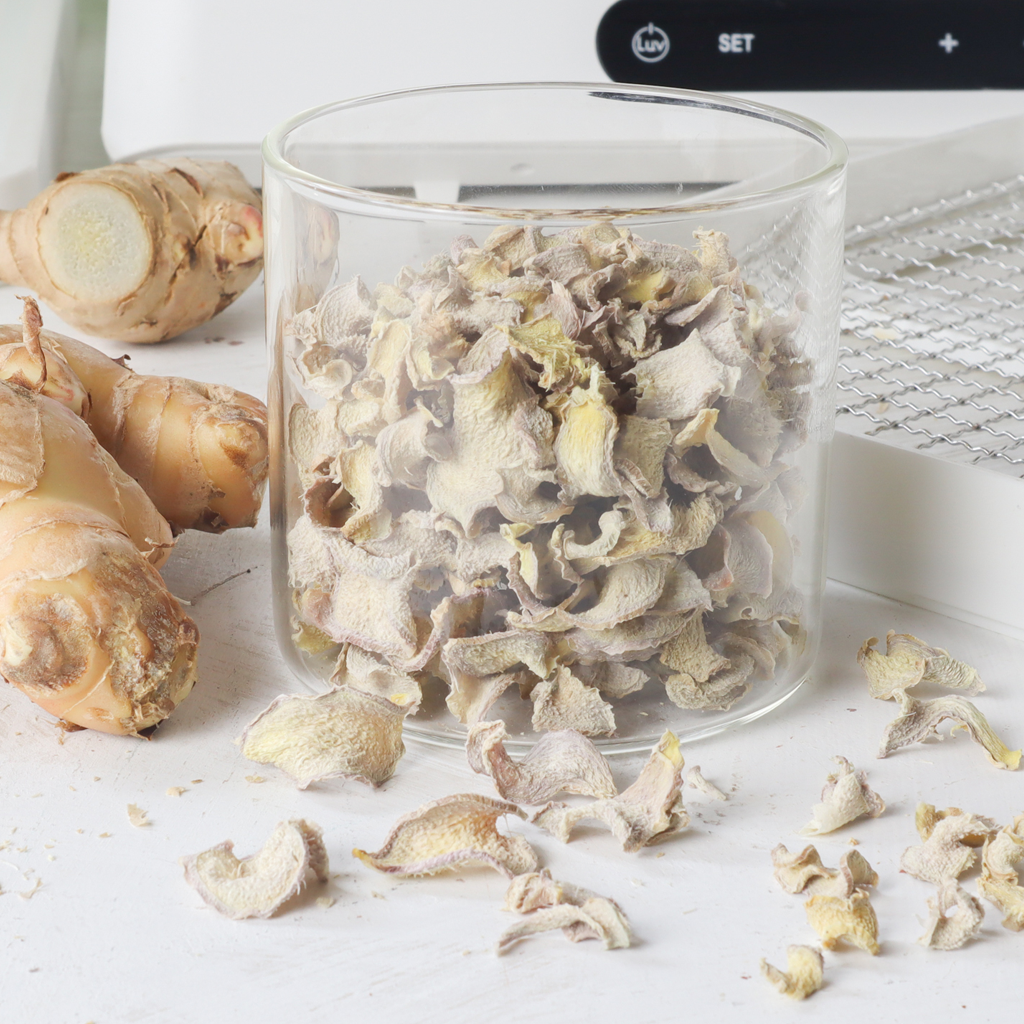Your Cart is Empty

Dehydrate ginger root and make ginger powder
Barb Hodgens
Barb Hodgens loves to cook with alternative, healthy whole food ingredients, with a focus on gut health. Barb has overcome her own gut health issues through healthy eating. Share your ideas, comments and photos at the end of this post :)

Therapeutic superstar spice with so many uses.
Ginger is a wonderfully therapeutic, warm spice with a sharp peppery flavour that makes an excellent addition to many dishes, especially Asian cuisine. Considered a superstar spice, ginger has a long history of use in treating a variety of ailments and even makes the list of top anti-inflammatory foods. Ginger tea and tonics like this homemade ginger ale have been used across the globe as natural remedies for symptoms like nausea for thousands of years.
Ginger can be used in many forms – fresh, dried or powdered. Although fresh ginger root is readily available it doesn’t stay fresh for long. The roots can dry out and become fibrous and hard or grow mould. One of the safest ways to store ginger is in dried form. For anyone who loves ginger or for those who simply can't use up their ginger root before it goes bad, dehydrating it is the best way to preserve it. Drying fresh ginger root in the Breeze Food Dehydrator ensures a supply of ginger for curries, soups, baking, smoothies, teas and detox baths for months, even years.

Once you have dried ginger you can grind it into a powder. Homemade ginger powder is amazingly pungent. Nothing you buy will compare to the fragrance and potency of freshly ground ginger. Use it just like you would with store-bought ginger powder.
Dehydrated ginger slices are great for making healthy ginger tea. As soon as dried ginger is added to hot water it will rehydrate and release its therapeutic compounds.

INGREDIENTS
Fresh ginger root
METHOD
1. Choose ginger that has thin, shiny skin that can easily be scrapped. Young ginger root, with soft and pliable skin may not need to be peeled. If the root is rough and woody, you'll want to peel it. The most flavour and therapeutic part of the flesh is right below the skin, so you don’t want to peel this away. The best method for removing the skin is scraping the root with the side of a spoon. You’ll find the skin peels off easily and you can get in and around the bumps without wasting any part of it.

2. Use a paring knife or mandolin to slice the root into thin, even slices. The thinner the slices, the more quickly and evenly they will dry.
3. We don’t recommend grating ginger because too much of the juice, which holds a lot of the flavour is lost.
4. Lay the slices onto the Breeze dehydrator trays without overlapping. The pieces will shrink in size so you can only need to allow a little space between for air circulation. Quite a few of our pieces fell through the wire racks as they dried.
5. For small pieces, line the trays with the silicon mesh sheets.
6. Ginger dries quite quickly but we set a low temperature to preserve the medicinal compounds. Set the temperature to 40° C / 104° F and the time to 5 hours to check in. Set it at one-hour intervals after that until it’s done.
7. The drying time will depend on the moisture in the ginger, your preparation method and your home's humidity.

8. It is important for the ginger to be completely dry before storing or grinding because any residual moisture could cause mould. Test a few pieces by taking them from the machine and letting them to come to room temperature. If they are slightly sticky or moist, then it means that they need more time in the dehydrator. Dried ginger should be a crunchy dry texture and you should be able to easily snap a piece in two. If you plan to grind your dried ginger, it’s better to over dry than under dry.
9. Grind only what you think you'll use in the next few months and store the rest whole.
10. Store dried ginger in an airtight jar in a cool, dry, dark space. It’ll last for up to a year.
If you make this, or any of our recipes, we would love to see your creations. Leave us a comment, or tag a photo using #luvelelife on Instagram.
PIN THIS RECIPE

Dehydrate ginger root and make ginger powder

Therapeutic superstar spice with so many uses.
Ginger is a wonderfully therapeutic, warm spice with a sharp peppery flavour that makes an excellent addition to many dishes, especially Asian cuisine. Considered a superstar spice, ginger has a long history of use in treating a variety of ailments and even makes the list of top anti-inflammatory foods. Ginger tea and tonics like this homemade ginger ale have been used across the globe as natural remedies for symptoms like nausea for thousands of years.
Ginger can be used in many forms – fresh, dried or powdered. Although fresh ginger root is readily available it doesn’t stay fresh for long. The roots can dry out and become fibrous and hard or grow mould. One of the safest ways to store ginger is in dried form. For anyone who loves ginger or for those who simply can't use up their ginger root before it goes bad, dehydrating it is the best way to preserve it. Drying fresh ginger root in the Breeze Food Dehydrator ensures a supply of ginger for curries, soups, baking, smoothies, teas and detox baths for months, even years.

Once you have dried ginger you can grind it into a powder. Homemade ginger powder is amazingly pungent. Nothing you buy will compare to the fragrance and potency of freshly ground ginger. Use it just like you would with store-bought ginger powder.
Dehydrated ginger slices are great for making healthy ginger tea. As soon as dried ginger is added to hot water it will rehydrate and release its therapeutic compounds.

INGREDIENTS
Fresh ginger root
METHOD
1. Choose ginger that has thin, shiny skin that can easily be scrapped. Young ginger root, with soft and pliable skin may not need to be peeled. If the root is rough and woody, you'll want to peel it. The most flavour and therapeutic part of the flesh is right below the skin, so you don’t want to peel this away. The best method for removing the skin is scraping the root with the side of a spoon. You’ll find the skin peels off easily and you can get in and around the bumps without wasting any part of it.

2. Use a paring knife or mandolin to slice the root into thin, even slices. The thinner the slices, the more quickly and evenly they will dry.
3. We don’t recommend grating ginger because too much of the juice, which holds a lot of the flavour is lost.
4. Lay the slices onto the Breeze dehydrator trays without overlapping. The pieces will shrink in size so you can only need to allow a little space between for air circulation. Quite a few of our pieces fell through the wire racks as they dried.
5. For small pieces, line the trays with the silicon mesh sheets.
6. Ginger dries quite quickly but we set a low temperature to preserve the medicinal compounds. Set the temperature to 40° C / 104° F and the time to 5 hours to check in. Set it at one-hour intervals after that until it’s done.
7. The drying time will depend on the moisture in the ginger, your preparation method and your home's humidity.

8. It is important for the ginger to be completely dry before storing or grinding because any residual moisture could cause mould. Test a few pieces by taking them from the machine and letting them to come to room temperature. If they are slightly sticky or moist, then it means that they need more time in the dehydrator. Dried ginger should be a crunchy dry texture and you should be able to easily snap a piece in two. If you plan to grind your dried ginger, it’s better to over dry than under dry.
9. Grind only what you think you'll use in the next few months and store the rest whole.
10. Store dried ginger in an airtight jar in a cool, dry, dark space. It’ll last for up to a year.
If you make this, or any of our recipes, we would love to see your creations. Leave us a comment, or tag a photo using #luvelelife on Instagram.
PIN THIS RECIPE

Subscribe
Sign up to get weekly healthy recipes & information on new product releases.
Item is added to cart


